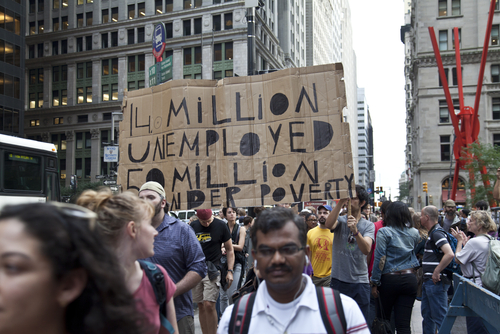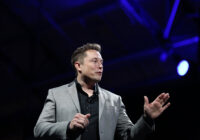If the rich and powerful get a voice and the rest of us do not, which direction is the nation likely to head in?
In spite of Bernie Sanders’ wins in Indiana and West Virginia, Hillary Clinton will almost certainly be the Democratic Party’s presidential nominee. This being the case, it may seem pointless to write about the media coverage of the election at this late stage. The biases run so deep and so clear that they have become yet another political reality that we simply take for granted. There may be some value, however, in discussing the possible results of this bias in the medium-to-long term, especially from the perspective of the Democratic race. What will it mean for American society in the future? What does it say about American society today?
In order to have this discussion, we should first lay some of the media bias out on the table. In debates, in newspapers and across the broad spectrum of digital media the current presidential primaries have been viewed almost exclusively from a set of deeply-held political biases. These biases appear so widespread that one forgets that they are biases at all. If a politician proposes programs to support education, healthcare, the poor, the young or the elderly, we must ask them how they plan on paying for it. The tone and repetition of these questions underlie the implicit argument that such things are not just expensive, but inherently too expensive. If a candidate plans on cutting taxes or expanding the military there is no need to question how they will pay for it at all.
Money in Politics
On the rare occasion they are in fact asked about the cost of such policies, there is no need to harp on the point. Let the candidate lie and then amiably move on. The Democratic primary has taken this long-established American pattern to new, and even more frustrating, lows by refusing to ask Hillary Clinton how she will pay for any of her proposals, ever (much less how she will get them through Congress). Bernie Sanders sought to pay for free public and state universities by imposing a 0.5% tax on stock trades (mirroring similar taxes in London and Frankfurt). Hillary? Well, she says she has a plan for that.
Fundamentally we should not be too surprised by the fact that the establishment seeks to protect its own. That Hillary Clinton received favorable treatment from media corporations who also contributed large amounts of money to her campaign (like Time Warner) is, again, so obvious it hardly bears repeating. What is worrying, however, is how sharply the American left (depressingly embodied by the Democratic Party) is breaking with anything that might even remotely be construed as “liberal.” It is now the basic dogma of the Democratic Party that money in politics is not a corrupting force. After all, if it cannot corrupt Hillary Clinton or Barack Obama (as many now contend), then how can Democrats claim that it corrupts anyone? In just under six years the Democrats have gone from viciously decrying Citizens United to broadly, if unconsciously, supporting it.
The US spends a shocking 17% of its GDP on healthcare and leaves roughly 30 million people with no health insurance at all, to say nothing of the hundreds of thousands of Americans who file for bankruptcy due to medical bills every single year.
The media tended to stay away from any mention of campaign finance—it was not asked as a direct question in any of the early debates. When they did finally begin mentioning it they framed the questioning from the same perspective as Citizens United: If you cannot prove a clear and immediate quid pro quo then money in politics must not have any corrupting influence. The media has helped normalize a cartoon image of corruption, while neglecting the trend lines in American policy that have been heavily favoring the wealthy since at least 1980. It is the job of writers, those of us who deal with the immortality of the written word, to provide readers with historical perspective. The corporate news media has consistently failed in this regard during the primaries. The healthcare debate provides one small example of this.
Universal Healthcare
Just eight years ago Democrats were fighting over what the precise terms of a universal healthcare system should look like; the argument between Hillary Clinton and Barack Obama on this regard was a notable feature of their campaign. Today, Democrats and left-leaning columnists have lined up en masse to declare universal healthcare “puppies and rainbows” or “unicorns” (to use the terms favoured by Ezra Klein and Paul Krugman). Many of these columnists had to reverse their own long-stated opinions regarding universal healthcare in order to more effectively attack Sanders and his ideas. Clinton set the stage for this abrupt turn to the right all the way back in January when she boldly announced that universal healthcare will “never, ever come to pass” at a rally in Des Moines. “No, we can’t,” indeed.
As usual, arguments about universal healthcare (caricatured exclusively as single payer in American debates) center around the cost of such a system. Americans like to believe that having more costs more. There is a certain, simple logic to this line of thinking that is understandably enticing. Unfortunately, the basic facts do not bear it out. As we well know, universal coverage systems on the whole tend to be drastically cheaper than the US system. The UK spends some 9% of GDP on healthcare and manages to cover every man, woman and child from womb to tomb.
The US spends a shocking 17% of its GDP on healthcare and leaves roughly 30 million people with no health insurance at all, to say nothing of the hundreds of thousands of Americans who file for bankruptcy due to medical bills every single year. Somehow this system is considered “realistic” (perhaps “pragmatic”) whereas cheaper, more efficient and vastly more humane systems that already exist in other developed countries are “puppies and rainbows.” The lack of imagination and independent thought that is required to reach the conclusions offered by otherwise “liberal” outlets is truly staggering. Under normal circumstances one would expect journalists to point out the gross cost of the American system and the substantial savings of moving toward a universal system. As a rule, they have overwhelmingly done the exact opposite during this election.
A Political Revolution

New York, 2011 © Shutterstock
There was a surging hope among the shattered remnants of the American left-wing that the rise of Bernie Sanders may mean a “political revolution” (to use his own term) that would sharply pull the United States back into line with the rest of the developed world. That this turn is not going to happen, at least not anytime soon, is now undeniable. What is truly shocking, however, is the conservative backlash that the movement has engendered in the mainstream Democratic Party. The reversal, already, of Obama’s regulation barring federal lobbyists from donating money to the Democratic National Committee (DNC) and its preferred candidates is just the beginning.
Without pressure from the left, which will almost certainly wither and recoil when Sanders formally concedes defeat, the “center” will no doubt work tirelessly to aggrandize even more political power into the hands of the wealthy few. The DNC has already engaged in a blunt form of money-laundering in support of Clinton, funneling contributions made to state party organs into the Hillary Victory Fund, thus signaling that they are willing to go out of their way to woo big money.
To the credit of most major news outlets this was widely reported. However, as usual, reporters failed to ask the logical follow-up questions. “Where will this system leave us in 10 or 20 years?” Like so much of American politics, the focus has been so narrowly limited to this one, single election cycle that no one seems to care about the medium-term implications of the decisions being made today. When the mass media—still the most prominent player in setting the “acceptable” parameters politics and policy—fails to look forward, it smothers the voice of us who do.
In this vacuum only those with access can talk about their long-term goals, usually in private (or at least shielded by a static machine). If the rich and powerful get a voice and the rest of us do not, which direction is the nation likely to head in? If we are lucky all of this money entering the system will ensure that our politics delivers more of the same. If we are unlucky, then the march toward oligarchy, a phrase uttered not just by Bernie Sanders but also by the venerable Jimmy Carter, will hasten.
For the millions of Americans who are worried about the collapse of their democracy, evidenced starkly in the Princeton study which concluded that the US is now largely an oligarchy, and the new two-tier America of haves and have-nots is there any hope? Maybe.
Perhaps it is best to see the campaign of Bernie Sanders not as a flash in the pan, but as part of a broader movement that first burst onto the national scene during the Occupy Wall Street movement. These many millions are still out there, and are still upset. If they continue to fight, then perhaps Americans will one day receive universal healthcare, maternity leave, paid vacation and better compensation for their labor. Then again, perhaps they won’t. Perhaps America is forever doomed to play the part of Rome to Europe’s Greece.
The views expressed in this article are the author’s own and do not necessarily reflect Fair Observer’s editorial policy.
Photo Credit: SurangaSL / Shutterstock.com
 We bring you perspectives from around the world. Help us to inform and educate. Your donation is tax-deductible. Join over 400 people to become a donor or you could choose to be a sponsor.
We bring you perspectives from around the world. Help us to inform and educate. Your donation is tax-deductible. Join over 400 people to become a donor or you could choose to be a sponsor.
Support Fair Observer
We rely on your support for our independence, diversity and quality.
For more than 10 years, Fair Observer has been free, fair and independent. No billionaire owns us, no advertisers control us. We are a reader-supported nonprofit. Unlike many other publications, we keep our content free for readers regardless of where they live or whether they can afford to pay. We have no paywalls and no ads.
In the post-truth era of fake news, echo chambers and filter bubbles, we publish a plurality of perspectives from around the world. Anyone can publish with us, but everyone goes through a rigorous editorial process. So, you get fact-checked, well-reasoned content instead of noise.
We publish 2,500+ voices from 90+ countries. We also conduct education and training programs
on subjects ranging from digital media and journalism to writing and critical thinking. This
doesn’t come cheap. Servers, editors, trainers and web developers cost
money.
Please consider supporting us on a regular basis as a recurring donor or a
sustaining member.
Will you support FO’s journalism?
We rely on your support for our independence, diversity and quality.






